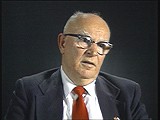
Oral History
Browse an alphabetical list of survivors’ oral histories. These interviews describe firsthand accounts and personal experiences during the Holocaust and World War II.
<< Previous | Displaying results 11-20 of 25 for "Oral History" | Next >>
-
John Dolibois describes interrogating German prisoners in preparation for postwar trials
Oral HistoryJohn Dolibois immigrated to the United States in 1931 at the age of 13. After graduating from college, Dolibois joined the 16th Armored Division of the US Army. Due to his German language skills, he became involved in military intelligence. He returned to Europe in this capacity toward the end of World War II. Dolibois interrogated German prisoners of war, including leading Nazis, in preparation for the postwar trials of war criminals. He was later appointed US ambassador to Luxembourg, his birthplace.
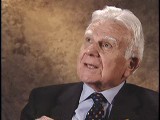
-
John Dolibois describes Justice Jackson's explanation of the purpose of the International Military Tribunal at Nuremberg
Oral HistoryJohn Dolibois immigrated to the United States in 1931 at the age of 13. After graduating from college, Dolibois joined the 16th Armored Division of the US Army. Due to his German language skills, he became involved in military intelligence. He returned to Europe in this capacity toward the end of World War II. Dolibois interrogated German prisoners of war, including leading Nazis, in preparation for the postwar trials of war criminals. He was later appointed US ambassador to Luxembourg, his birthplace.
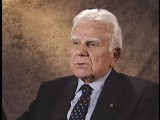
-
John Dolibois describes translating for a prison psychiatrist
Oral HistoryJohn Dolibois immigrated to the United States in 1931 at the age of 13. After graduating from college, Dolibois joined the 16th Armored Division of the US Army. Due to his German language skills, he became involved in military intelligence. He returned to Europe in this capacity toward the end of World War II. Dolibois interrogated German prisoners of war, including leading Nazis, in preparation for the postwar trials of war criminals. He was later appointed US ambassador to Luxembourg, his birthplace.

-
John Komski describes Krakow after the outbreak of World War II
Oral HistoryJohn, who was born to a non-Jewish Polish family, graduated from an art academy. Following the German invasion of Poland on September 1, 1939, John was in Krakow. Food became scarce in Krakow, with long lines of people waiting for whatever food was available. John decided to join the resistance against the Germans. By early 1940, he and two of his friends felt that they were in danger and decided to try to escape to France. John was caught and arrested during this escape attempt. He survived imprisonment…
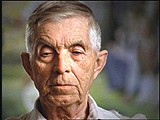
-
John Komski describes resistance activities in Krakow, including an underground newspaper
Oral HistoryJohn, who was born to a non-Jewish Polish family, graduated from an art academy. Following the German invasion of Poland on September 1, 1939, John was in Krakow. Food became scarce in Krakow, with long lines of people waiting for whatever food was available. John decided to join the resistance against the Germans. By early 1940, he and two of his friends felt that they were in danger and decided to try to escape to France. John was caught and arrested during this escape attempt. He survived imprisonment…
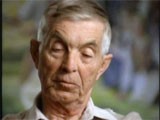
-
John Woodruff describes winning an Olympic medal
Oral HistoryIn 1936, John Woodruff was one of 18 African Americans on the US Olympic team competing in Berlin. He won the gold medal for the men's 800-meter race. In this clip he describes his feelings upon winning the medal. Interview date: May 15, 1996
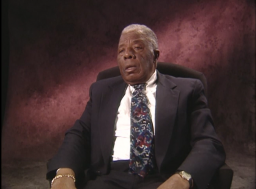
-
Joseph Maier describes former Auschwitz commandant Rudolf Hoess at the Nuremberg trial
Oral HistoryJoseph immigrated to the United States in 1933 after finishing university in Leipzig. His parents and brother had left Germany earlier for the United States. Joseph attended Columbia University. From 1940 to 1943 he was assistant editor for a New York German-Jewish newspaper. In 1944, he worked in the American embassy in Britain as a propaganda analyst. He went to Nuremberg, Germany, as an interpreter in 1946. He analyzed materials and transcripts, and participated in many interrogations for the Nuremberg…
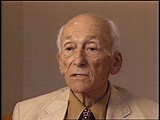
-
Joseph Maier describes Hermann Göring at Nuremberg
Oral HistoryJoseph immigrated to the United States in 1933 after finishing university in Leipzig. His parents and brother had left Germany earlier for the United States. Joseph attended Columbia University. From 1940 to 1943 he was assistant editor for a New York German-Jewish newspaper. In 1944, he worked in the American embassy in Britain as a propaganda analyst. He went to Nuremberg, Germany, as an interpreter in 1946. He analyzed materials and transcripts, and participated in many interrogations for the Nuremberg…
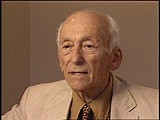
-
Joseph Maier describes Hjalmar Schacht at the Nuremberg trial
Oral HistoryJoseph immigrated to the United States in 1933 after finishing university in Leipzig. His parents and brother had left Germany earlier for the United States. Joseph attended Columbia University. From 1940 to 1943 he was assistant editor for a New York German-Jewish newspaper. In 1944, he worked in the American embassy in Britain as a propaganda analyst. He went to Nuremberg, Germany, as an interpreter in 1946. He analyzed materials and transcripts, and participated in many interrogations for the Nuremberg…
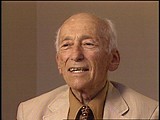
-
Joseph Stanley Wardzala describes conditions at the forced-labor camp in Hannover
Oral HistoryJoseph and his family were Roman Catholics. After Germany invaded Poland in 1939, roundups of Poles for forced labor in Germany began. Joseph escaped arrest twice but the third time, in 1941, he was deported to a forced-labor camp in Hannover, Germany. For over four years he was forced to work on the construction of concrete air raid shelters. Upon liberation by US forces in 1945, the forced-labor camp was transformed into a displaced persons camp. Joseph stayed there until he got a visa to enter the…
